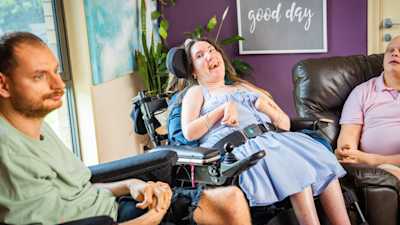Many travellers like to take each day as it comes, however if you or your travelling companion has a disability - then a little extra planning goes a long way towards having a fun and relaxed trip.
Local and national travel is back on after a tough 2020 and now that the boarders between Australia and New Zealand have reopened, Aussies are flooding across the ditch.
We understand that people with disability may face obstacles along the way, so we have looked at the challenges and the how-to of accessible travel and put together top tips for travelling with a disability or travelling with a person who has a disability.
Air travel
Airlines and airports are bound by the Disability Discrimination Act (DDA) to provide services for people with a disability.
Some airlines have a limit of only two wheelchairs on each domestic flight (or one if it is an electric wheelchair). So it’s a good idea to book flights in advance, if you use a wheelchair are travelling with a guide dog or need to bring medical equipment like a CPAP device or oxygen onboard with you. Graeme Innes, who sits on the Life Without Barriers board and is vision impaired, has written a great blog post about travelling with guide dogs here!

Image: Yellow guide dog lying on the floor of a room. There is grey carpet and people in suit pants and business shoes standing around them.
Remember, if you are travelling solo or need an extra hand then staff on a flight should be able to assist with:
getting around the airport
handling baggage
getting on and off the plane
getting to and from the plane toilet
opening packages and identifying food on board the plane
delivering safety briefings in a way that all passengers can understand.
With bright lights, loud announcements, bustling crowds, and new COVID rules, airports can be overwhelming for anyone - especially those with sensory sensitivities and people with autism, dementia, or anxiety.
Thankfully, some airports are now introducing programs like Hidden Disabilities, which was first trialled in Australia at Brisbane Airport. The program provides extra support for travellers who may need additional assistance.
There are also some strategies you can try to help ease the stress of moving through a terminal. Wearing noise-cancelling headphones or carrying sensory items can make a huge difference in comfort.
Don’t forget your travel insurance
To get the right level of travel insurance, make sure you provide your insurer with information about your disability. You might want to shop around – some insurers cover more pre-existing medical conditions than others.
Before you buy your insurance, just make sure that you’re comfortable with what’s covered and what’s not.
Hire cars
Most bigger hire car companies include accessible vehicles in their fleets, and some, including Avis and Hertz, offer vehicle modifications including hand controls, swivel seats and transfer boards in some major cities. There are also dedicated disability transport organisations, some of which are listed below:
Accommodation
Most major hotel booking sites have the option to filter for accessible accommodation, but Hotels.com is the stand-out, with a range of specific search criteria including facilities for people who are hearing impaired, who require braille signage, accessible parking, a roll-in shower and more.
It’s a good idea to ask for photos when researching accommodation options. Accessibility standards vary from country to country – you can ask for a picture of the bathroom, for example, to make sure that it’s suitable for you.
Websites such as Accessible Accommodation Providers have accessible accommodation directories collated by people with disability – so you know you can trust the reviews!

Image: A man with red hair sitting in a wheelchair at the airport. He is wearing a black tracksuit, a face shield and facemask. There is a woman with short blonde hair wearing a white shirt and dark blazer pushing him. She also has a face shield and facemask. There is blue sky, clouds and a airplane control tower in the background.
Getting ready for take-off
With accommodation, travel and insurance booked the hard work is done and it’s time to start packing! As well as your favourite holiday read, remember to pack an emergency repair kit if you use wheelchair or mobility device; spare batteries if your device uses them; and extra supplies of any medications in case of flight delays. A letter from your doctor explaining your disability and any medications you require is also a great idea. If COVID has taught us anything it is to expect the unexpected!
Other Resources
Most importantly, enjoy your trip!


